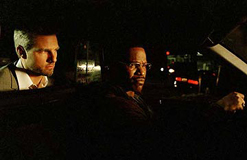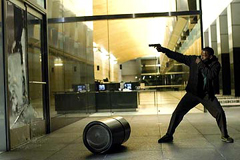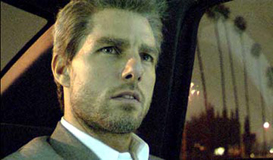Collateral (Michael Mann, 2004)
 Much has been made of Michael Mannís
depiction of Los Angeles in Collateral,
and with good reason. This is one of those rare films where youíre never for a
minute able to forget where the action is taking place. Thereís constant
tension in nearly every shot of the film. Even though it takes place during the
night, thereís nothing sleepy about the city, and thatís reflected in the
way that the artificial lights that dot the streets refuse to go out and the
smoggy brown skies refuse to darken. Through Mannís eyes, L.A. becomes a
series of empty freeways, where there donít seem to be enough cars in the
world to fill the void. Empty walkways and corridors seem to have been
constructed in a city where no one does any walking. The streets of this city
may be deserted, but theyíre undeniably alive. As the long night slowly slides
from the dreamy to the nightmarish, the film follows cabbie Max (Jamie Foxx)
after he picks up Vincent (Tom Cruise), a hitman who intends to use Max as his
driver, as he goes about assassinating an oddly multi-cultural series of marks.
Itís a weak plot, but itís one that allows Mann to demonstrate whatís
clearly one of the yearís most impressive and sustained directorial
tour-de-forces.
Much has been made of Michael Mannís
depiction of Los Angeles in Collateral,
and with good reason. This is one of those rare films where youíre never for a
minute able to forget where the action is taking place. Thereís constant
tension in nearly every shot of the film. Even though it takes place during the
night, thereís nothing sleepy about the city, and thatís reflected in the
way that the artificial lights that dot the streets refuse to go out and the
smoggy brown skies refuse to darken. Through Mannís eyes, L.A. becomes a
series of empty freeways, where there donít seem to be enough cars in the
world to fill the void. Empty walkways and corridors seem to have been
constructed in a city where no one does any walking. The streets of this city
may be deserted, but theyíre undeniably alive. As the long night slowly slides
from the dreamy to the nightmarish, the film follows cabbie Max (Jamie Foxx)
after he picks up Vincent (Tom Cruise), a hitman who intends to use Max as his
driver, as he goes about assassinating an oddly multi-cultural series of marks.
Itís a weak plot, but itís one that allows Mann to demonstrate whatís
clearly one of the yearís most impressive and sustained directorial
tour-de-forces.
 Like the protagonists in the classic
Hollywood films of Anthony Mann, Hawks or Ford, the leads of Collateral
express themselves through their action as much as their locution. Thereís
a pronounced difference in the way that the two lead actors move during their
action scenes, with Foxx always stumbling clumsily through situations, while
Cruise achieves an absurd but beautiful Woo-like grace. Their differences in
philosophy are extreme enough that we can understand how they each have an
outlook thatís harmful to them. Mann's use of style is not vapid, because it's
constantly aware of the two forces at play here, even as it grounds both of them
in the soupy haze of the Los Angeles skyline. When Vincent mentions that the
city makes him uneasy, itís easy to see what he means. Throughout, atmosphere
remains inescapable and Mannís direction is to thank. Itís excellent
technical work that should not be overlooked at the yearís end. A Korean club
shootout about two-third of the way through the film is a hell of an action
movie set piece, but it's also completely in touch with the perspectives of the
main characters in a way that you just don't see in lesser action movies.
Like the protagonists in the classic
Hollywood films of Anthony Mann, Hawks or Ford, the leads of Collateral
express themselves through their action as much as their locution. Thereís
a pronounced difference in the way that the two lead actors move during their
action scenes, with Foxx always stumbling clumsily through situations, while
Cruise achieves an absurd but beautiful Woo-like grace. Their differences in
philosophy are extreme enough that we can understand how they each have an
outlook thatís harmful to them. Mann's use of style is not vapid, because it's
constantly aware of the two forces at play here, even as it grounds both of them
in the soupy haze of the Los Angeles skyline. When Vincent mentions that the
city makes him uneasy, itís easy to see what he means. Throughout, atmosphere
remains inescapable and Mannís direction is to thank. Itís excellent
technical work that should not be overlooked at the yearís end. A Korean club
shootout about two-third of the way through the film is a hell of an action
movie set piece, but it's also completely in touch with the perspectives of the
main characters in a way that you just don't see in lesser action movies.
 Mannís style glorifies Vincent only
insofar as he glorifies himself with his quasi-existential view of his place in
the world. Max is only entertaining his blather because he's shaken, and because
Cruise's persona is so persuasive in its devilsh way. We're supposed to be
skeptical of it, even as we see how someone could delude themselves into
thinking they're above petty concerns like morality. Itís no surprise when you
feel that Maxís hardworking, professional demeanor wins the directorís
truest sympathies. As the two demonstrate their masculine confidence in an
attempt to dominate the other, it becomes apparent that as much as Collateral
is about the surface level tensions between the two characters, itís also
about the way that the men have their two completely different viewpoints, yet
inhabit the same, daunting physical space. All of the expended machismo in the
world doesnít keep either of them from being dwarfed by the megalopolis that
surrounds them.
Mannís style glorifies Vincent only
insofar as he glorifies himself with his quasi-existential view of his place in
the world. Max is only entertaining his blather because he's shaken, and because
Cruise's persona is so persuasive in its devilsh way. We're supposed to be
skeptical of it, even as we see how someone could delude themselves into
thinking they're above petty concerns like morality. Itís no surprise when you
feel that Maxís hardworking, professional demeanor wins the directorís
truest sympathies. As the two demonstrate their masculine confidence in an
attempt to dominate the other, it becomes apparent that as much as Collateral
is about the surface level tensions between the two characters, itís also
about the way that the men have their two completely different viewpoints, yet
inhabit the same, daunting physical space. All of the expended machismo in the
world doesnít keep either of them from being dwarfed by the megalopolis that
surrounds them.
77
Jeremy Heilman
08-10-04